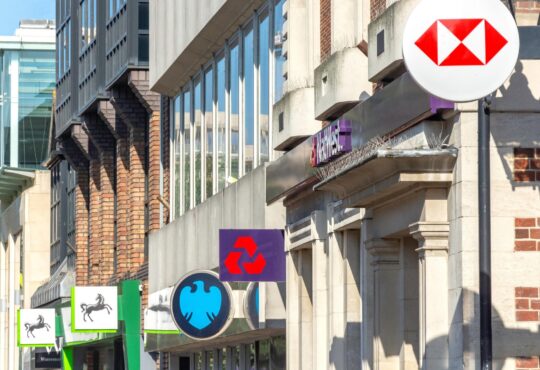If you want to work in banking, you need to get moving.
Get Morning Coffee ☕ in your inbox. Sign up here.
If you think that’s a general statement – it’s not. If you’re in university now (and if you’re reading this, you probably are), there’s something you can do to get yourself an investment banking job. Hell, it might even be too late for you.
Investment banks are some of the most competitive work environments in the world, and you’re going to have much more of an uphill struggle getting in than you did going to university. We’re not exaggerating either – Harvard’s acceptance rate is around 3.2%, Oxford’s is around 14%, and Goldman’s Sachs’ is around 1.5%.
If you want to get into banking, you need to start early. The earlier the better. Even earlier than that.
1. Getting an investment banking job in kindergarten
Let’s not exaggerate.
1. Getting an investment banking job in your first year of university
This isn’t possible either, but you can certainly lay the foundations for your career in your first year at university – hopefully it’s the university you wanted and, more importantly, the university that a bank might want.
You have two goals in your first year of university – to do some insight days and to do at least one spring internship.
Insight days, also known as campus days or webinars depending on if they’re in person, involve food, or are online (respectively), are single-day events hosted by banks. They’re for deciding if investment banking is for you primarily, as well as for networking, if you heart’s already set.
Spring internships, also known as spring weeks, are the important ones. You’ll need one of these. These are week-long programs, run during the Easter break specifically for first-year students. They’re important because spring interns make up a significant portion of a bank’s summer interns (more on that later).
Data from Trackr, formerly the Bristol Tracker, suggests that up to 90% of spring interns are offered summer internships at some banks (such as Citi), although at others that number is as low as 15% (at JPMorgan). Spring internships are useful to have on your CV regardless, with Trackr estimating that having completed a prior spring week were 95% more likely to receive an interview for a summer internship.
While insight days and ‘orientation events’ are run throughout the year, you will normally need to apply for a spring week by January or December, and ideally around September or October times, so keep a look out for deadlines on banks’ websites. We go into some more detail about graduate timelines here.
Even if you choose not to attend student events in your first year for whatever reason, it’s still a good idea to research banks and generally prepare for second year applications. Our graduate guide can give you help you decide what banks, sectors, and role you want to apply for.
2. Getting an investment banking job in your second year of university
Your second year is when things really start happening.
Once you know what you want to, you can devote the first term of your second year to applying for summer internships (aka summer analyst programs) at different banks in the sector. It’s this second-year summer internship that’s crucial to landing an investment banking job when you graduate says John Craven, former Merrill Lynch and SocGen Director and present CEO of System 2, an Australian NGO.
Application timelines for summer analyst programs vary considerably. In Europe and Asia, they open a year before they start (so just before you start your second year at university) and close around November or December at the latest. In the USA, they open in December or January of your first year – 18 months before the internship even starts. Deadlines vary in the US, but are generally between July and September, although some were as early as March.
Getting onto a summer analyst program is not easy. Banks are incredibly fussy about who they hire for summer internships. If you want to get one, you’ll need to go through the process below.
i. The investment banking application form
The recruitment process varies somewhat from bank to bank. Although most use an application form, some, such as Goldman Sachs, prefer a traditional CV/resume and cover letter combination.
The application form is the crucial filtering mechanism in a banks’ application process. This is where most of the unsuccessful candidates are stripped away.
ii. Grade requirements for investment banking
To succeed, you’ll need excellent academics. In the UK, this means around 216 UCAS points, the equivalent to around 3 A*s and an A, plus a degree class of 2.1 or above, ideally from a top university.
In the US, The cutoff for grades is generally a GPA of around 3.5 for most candidates from top universities. There is some flexibility with that number, however. Non-target university students will be expected to have higher grades. People with difficult majors can be accepted with lower GPAs, as are those with extenuating circumstances, such as family crises during their studies.
Grades in Hong Kong and Singapore are harder to pin down, but on job postings we’ve seen that mention them (most do not), the listed requirements were a 3.2 GPA or a 2:1. These are likely bare minimums to not get your CV thrown out – assume that the UK & US rules above are the “real” requirements.
Different banks have different requirements, too – an elite bank or an elite team within a bank will accept more than less prestigious banks & sectors.
You’ll also need strong extracurriculars. Academic studies suggest that banks like to hire students whose extracurricular activities resonate with the bankers interviewing them: skiing, scuba diving, and tennis all count highly (especially if you were a team leader at university). So does volunteering.
iii. Investment banking pre-interview tests
Assuming your application checks out, you’ll have some tests before the actual interview. Although banks have historically been big on psychometric tests, these have been falling somewhat out of favour recently (although not entirely).
You’re much more likely to come across a HireVue interview. We did a pretty good roundup of what they involve here, but in a nutshell, they’re a fancy software that basically analyses you in an interview manner with pre-loaded questions.
Once upon a time, these were mostly personality-based questions. Nowadays, they’re more competency based, with questions concerning your ability to handle conflict in a team, stick to a tight deadline, and that sort of thing. We have great lists of interview questions on the site – here for applicants to US banks, and here for applicants to European banks.
iv. Investment banking interviews
Assuming you did well and convinced the AI that counts how many of your nose hairs are visible and compares it to the average number at the bank, you’ll get a call for an interview in person.
At J.P. Morgan in EMEA, this means an assessment center – at Goldman Sachs, it means endless “structured interviews”. As one ex-Goldman recruiter said to us, the firm “is all about round after round of face-to-face interviews – there’s a big emphasis on character and being the sort of interesting person they want to work with.”
Assessment centers, also known as SuperDays, are days of interviews, case study exercises, group tasks, and presentations. This is your time to shine. The interviews are the same as they’ve always been, and we have great resources on what questions they’ll ask here. And don’t forget to be yourself, assuming you’re interesting.
Case study exercises, group tasks, and presentations plop you into the role of an investment banker to see how you do. This can mean weighing up investment opportunities, product launches, or trading strategies, based on what part of the bank you’re applying to. You’ll work both alone and with others.
v. Converting your investment banking internship
Banks don’t require you to join any religion to work for them, but if you want a job, you’re going to want to receive an offer after your internship – also known as “converting” it.
We go into more detail here, but the gist of converting the internship is to be hard working, reliable, and sociable. It’s not an exact science, but you should have a decent shot if you’ve come this far – it’s around 50-75% of internships that become offers.
3. Getting an investment banking job in your third year of university
If you’ve already got your offer, congratulations, pass go and collect $200.
If you didn’t, well, back to steps i-iv for you. If you already had an internship but failed to convert it, don’t get your hopes up – it can be a scarlet letter to have interned with a bank without converting. It makes sense – “why would I take you when my rivals wouldn’t?”
You still have some options open, such as off-cycle internships and full-time analyst programs, but the odds are stacked against you if you don’t have an internship under your belt – ideally some. They don’t even have to be in banking, really.
Another option for you at this stage is to do a master’s degree in finance or management. This allows you to essentially wind the clocks back and go through the entire application process all over again as though you were a fresh-faced second-year, with the wisdom and cunning of a grizzled old fox.
If that doesn’t work either, honestly, maybe banking just isn’t for you. There’s only so much money and time you can throw at – wait, what? You want another go?
Luckily for you, there are a few ports of call before the ship is too far from land, and that’s to do an MBA and apply to all of the above programs, but with “associate” at the end, rather than “analyst”. If that still doesn’t work, then do a PhD. If that still doesn’t work – well, we’ve run out of road. Start your own bank.
Good luck. You’ll need it.
Have a confidential story, tip, or comment you’d like to share? Contact: +44 7537 182250 (SMS, Whatsapp or voicemail). Telegram: @SarahButcher. Click here to fill in our anonymous form, or email [email protected]. Signal also available.
Bear with us if you leave a comment at the bottom of this article: all our comments are moderated by human beings. Sometimes these humans might be asleep, or away from their desks, so it may take a while for your comment to appear. Eventually it will – unless it’s offensive or libelous (in which case it won’t.)





